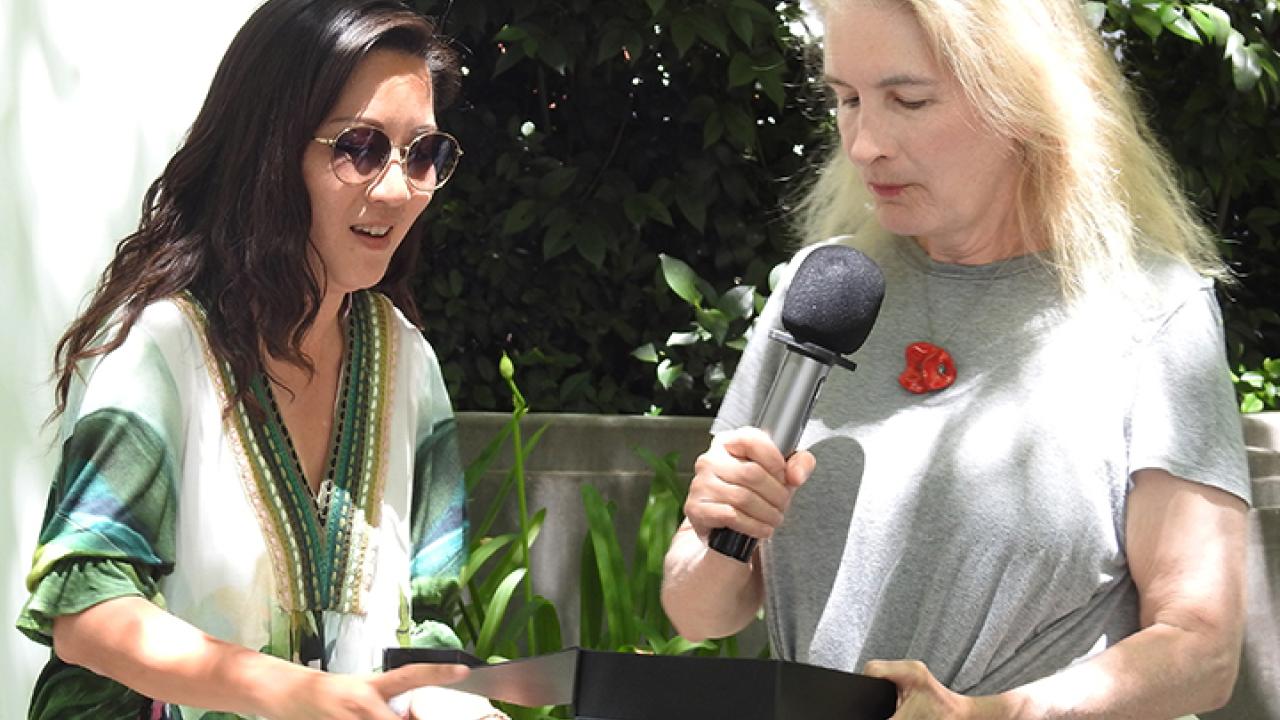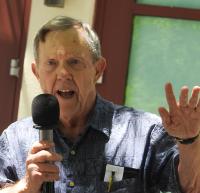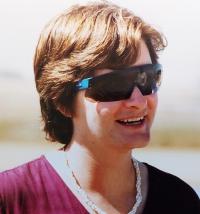
Sharon Lawler: Aquatic Entomologist, Teacher, Mentor

A dedicated aquatic entomologist. Curious, reliable and "always has your back."
So said UC Davis emeritus professor Hugh Dingle when he praised UC Davis professor emerita Sharon Lawler at the department's June 11th retirement event at the UC Davis Alumni Center.
Lawler retired in January 2023 after a 28-year career with the department.
Dingle, who shared an office in her lab at Briggs Hall, pointed out she was "frequently called upon because of her reliablity," such as "heading up the very large Ecology Grad Group."
"I'm grateful for her personal help in providing me an office in her lab when I retired where I could participate in department events and where I largely wrote my book on migration." Dingle, a member of the faculty from 1982 to 2002, achieved emeritus status in 2003. He published the second edition of Migration: The Biology of Life on the Move (Oxford University Press) in November 2014.

Sharon Lawler, a native of Maplewood, N.J., graduated in 1982 from Lehigh University, Bethlehem, Penn., with a bachelor's degree in biology. She then headed to Rutgers University, New Brunswick, N.J., for her master of science degree in ecology (1988) and her doctorate in ecology and evolution (1992). Lawler completed a two-year term as a postdoctoral researcher at the Imperial College, Silwood Park, Ascot, UK, and a year as a postdoc researcher in biological sciences at the University of Kentucky, Lexington, before joining the UC Davis Department of Entomology in 1995. She retired in January 2023.
Her first UC Davis publication, co-authored with colleagues, dealt with tree frogs: “Thermal Physiology, Phenology, and Distribution of Tree Frogs," published in The American Naturalist in 1988. Her first publication as lead author: “Behavioural Responses to Predators and Predation Risk in Four Species of Larval Anurans." (1989, Animal Behaviour)
In an earlier news story, published in October 2023, UC Distinguished Professor Richard “Rick” Karban, a community ecologist and colleague (who is retiring in June after a 42-year career in the department) commented “She was focused on what they needed from her rather than the other way around. In the department, she did more than her fair share of student-centric tasks. She was committed to accommodating and including the diverse circumstances of students before that was on many people's radars. Co-teaching community ecology with Sharon for 28 years, I learned a lot about science and even more about how to treat other people with compassion.”

“One incident that stands out for me,” Karban recalled, “is a time that we were walking back to Briggs Hall from teaching on the east side of campus. “Near the Memorial Union, we saw someone who was having a bad trip. He was yelling, waving his arms, and stumbling around. My reaction was to get away from the guy in case he was dangerous. Instead, Sharon went over to him to see if she could help. She stayed and talked with him to make sure he was okay.”
An avid researcher, Lawler is the co-principal investigator (with John Eadie and Daniel Karp of Department of Wildlife, Fish, and Conservation Biology) of a substantial grant, the Integrated Wetland Management Project, to develop reduced-pesticide mosquito control via beneficial predators. The grant, awarded in 2022, has no expiration date.
Over the last five years, her other grants, ranging from $88,000 to $659,000, dealt with
- “Impacts of Storm-Driven Contaminants on Larval Delta Smelt and the Community Scale Adaptive Capacity of Prey Items to Handle Those Stressors.” (Richard Connon, principal investigator)
- “Post Fire Ecology and Habitat Suitability Evaluation for the Proposed Federally Listed Sierra Nevada Yellow-Legged Frog on the Lassen and Plumas National Forests.” USDA: Forest Service (with Sarah Yarnell and Cathy Brown)
- “High-Throughput Biomonitoring of Aquatic Invertebrates.” (Richard Connon, co-principal investigator), California Department of Pesticide Regulation
- “Area-wide Management of Aquatic Weeds in the Sacramento/ San Joaquin River Delta for Sustainable Control in Farming Areas, Critical Wildlife Habitats, Recreational Zones and Water Conveyance Systems Important for California Agriculture and Human Health.” (Patrick Moran, principal investigator)

Lawler's academic activities included chairing the Entomology and Nematology Curriculum Committee from 2017 to 2022; serving as the lead faculty advisor for the department from 2003 to 2022; and chairing a number of academic search committees. She served on the editorial board for the international peer-reviewed Journal of Ecology and Journal of
Ecological Monographs from 2002-2021 and held membership in the Faculty of 1000, Freshwater and Marine Ecology, from 2008 to 2021. Lawler also completed two terms as chair of the Graduate Group in Ecology, and as chair of the Designated Emphasis in the Biology of Vector-Borne Diseases.
"In general, my research has been aimed at preserving aquatic biodiversity. In entomology, my lab's research has helped Mosquito and Vector Abatement Districts choose control methods that protect public health in ecologically sound ways," Lawler related in the October 2023 news story spotlighting her career. "I also collaborated with the Larry Godfrey and Richard Connon labs on projects that revealed non-target effects of various agricultural chemicals on aquatic insects and other taxa." (Note: The late Larry Godfrey, 1956-2017 was a UC Cooperative Extension entomology specialist and Richard Connon, recently retired, served on the School of Veterinary Medicine faculty and is with the UC Davis Coastal and Marine Sciences Institute.)

"Not all of my projects were in entomology. In other work we evaluated whether various invasive species harm native frogs or snakes; invasives included a fungus, bullfrogs, and various fishes. These projects have helped wildlife managers conserve native species. I've also done research on how food web structure affects population dynamics, using protists as a model system.”
“As an instructor, I enjoyed teaching aquatic entomology, especially getting students out to our Natural Reserves to see insects in their habitats. I also loved teaching Community Ecology to graduate students from several graduate groups; we have top-notch students and discussion sessions were rewarding.”
“I'll miss the great people of our Department and the Phoenix Cluster the most," Lawler said. "I felt very lucky to be among so many pleasant, professional, and fun folks. I will also miss daily interactions with students and colleagues in a variety of graduate groups and departments. UC Davis is full of kind, intelligent do-gooders in all sorts of jobs!”
